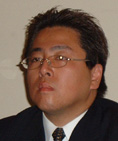Attitudes towards the Police in Contemporary Japan - Part Four: A Policeman's Perspective on the Force's Current Difficulties
Noriaki Kawamura (Deputy Director of Police Policy Research Centre at the National Police Academy of Japan), Sean Curtin (GLOCOM fellow and Asia Times) and Dr. Tom Williamson QPM (Senior Research Fellow, Institute of Criminal Justice Studies, University of Portsmouth)
A full list of articles in this series can be found here.
Sean Curtin: The national police statistics for cleared crime cases registered an increase of 12,000 cases in 2003. However, a police scandal in Hyogo Prefecture that surface at the beginning of July casts doubt on the accuracy of these figures. It has been discovered that more than 60 patrol officers in the Hyogo Prefectural Police falsified some 200 investigation documents in the last two years. This was done apparently to enhance their performance ratings. What is your opinion on this issue?
 Noriaki Kawamura: How reliable are the statistics? I think the system is the same as in the UK. We have an international auditor division, so we have checked our data and can compare the performance of our officers [with those in other countries]. I think the system works very well, but sometimes, as in the Hyogo case you mentioned, there problems. Noriaki Kawamura: How reliable are the statistics? I think the system is the same as in the UK. We have an international auditor division, so we have checked our data and can compare the performance of our officers [with those in other countries]. I think the system works very well, but sometimes, as in the Hyogo case you mentioned, there problems.
Sean Curtin: How much trust can Japanese people have in their police today? I am thinking here of the most recent spate of police slush fund scandals involving several police forces in Hokkaido, Fukuoka, Shizuoka and Kyoto. Other similar scandals have surfaced in Tokyo, Kumamoto, Aichi and Miyagi Prefectures.
Noriaki Kawamura: Well, the Japanese mass media is always watching the police and always sending reporters to cover all aspects of police work. They have built up relationships with many detectives and police officers. If an officer does something wrong, I think the media discover this quite easily. So I think the police statistics are very reliable
Of course, sometimes there are some bad apples. The slush fund subject is a very touchy issue. Five years ago, there were some very bad practices in accounting such as the Hokkaido case or the Fukuoka case. The fundamental problem is that the police do not have any entertainment or socializing budget compared with other professions. Sometimes, there are circumstances under which the police need a lot of money to deal with serious cases and we need a pool of money to deal with these occasional needs. So, some senior police officials in a few prefectures created such funds. [This is the background to why] some prefectural police forces got caught up in bad accounting practices. Now, I think this issue has been cleared up and you will not now find such misconduct. So, as I have said now these problems have been sorted out, I think that today people trust the police and they will in the future.
Sean Curtin: Do you think the media is too hard on the police?
Noriaki Kawamura: Yes, I most certainly do.
Dr. Tom Williamson QPM: I would just like to add that police forces in other countries are also under very intensive investigation at the moment for the same kind of slush fund arrangements at the very highest level.
A full list of articles in this series can be found here.
The above comments were made at Daiwa Foundation Japan House in London on 13 July 2004 as part of a seminar entitled Responding to Rising Crime in Japan.
Profile: Noriaki Kawamura
Noriaki Kawamura is currently Deputy Director of Police Policy Research Centre at the National Police Academy of Japan. Previously, he served as Chief of the Intelligence Section of Kyoto Prefecture Police Department (2002-04), and as Assistant Director of the Crime Prevention Planning Division at the National Police Agency (1997-2000).
Reference Articles
Ex-Hokkaido police chief blows whistle over slush fund
Mainchi Shimbun, 10 February 2004
Hyogo police faked reports in bid to shine
Japan Times, 1 July 2004
Shizuoka cops admit embezzling millions
Japan Times, 6 March 2004
Hokkaido police chief admits funds scam
Japan Times, 13 March 2004
| 




